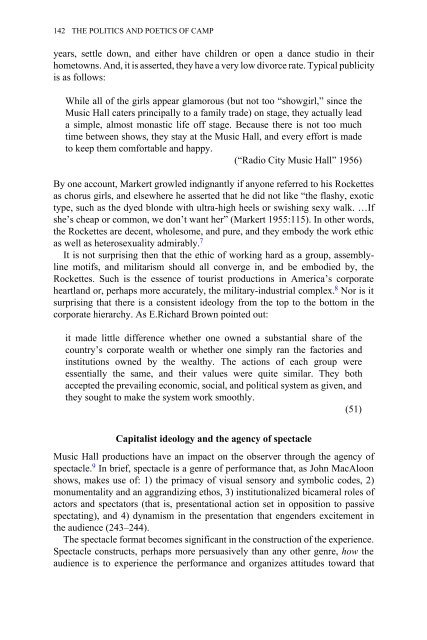Edited by Moe Meyer - Get a Free Blog
Edited by Moe Meyer - Get a Free Blog
Edited by Moe Meyer - Get a Free Blog
Create successful ePaper yourself
Turn your PDF publications into a flip-book with our unique Google optimized e-Paper software.
142 THE POLITICS AND POETICS OF CAMP<br />
years, settle down, and either have children or open a dance studio in their<br />
hometowns. And, it is asserted, they have a very low divorce rate. Typical publicity<br />
is as follows:<br />
While all of the girls appear glamorous (but not too “showgirl,” since the<br />
Music Hall caters principally to a family trade) on stage, they actually lead<br />
a simple, almost monastic life off stage. Because there is not too much<br />
time between shows, they stay at the Music Hall, and every effort is made<br />
to keep them comfortable and happy.<br />
(“Radio City Music Hall” 1956)<br />
By one account, Markert growled indignantly if anyone referred to his Rockettes<br />
as chorus girls, and elsewhere he asserted that he did not like “the flashy, exotic<br />
type, such as the dyed blonde with ultra-high heels or swishing sexy walk. …If<br />
she’s cheap or common, we don’t want her” (Markert 1955:115). In other words,<br />
the Rockettes are decent, wholesome, and pure, and they embody the work ethic<br />
as well as heterosexuality admirably. 7<br />
It is not surprising then that the ethic of working hard as a group, assemblyline<br />
motifs, and militarism should all converge in, and be embodied <strong>by</strong>, the<br />
Rockettes. Such is the essence of tourist productions in America’s corporate<br />
heartland or, perhaps more accurately, the military-industrial complex. 8 Nor is it<br />
surprising that there is a consistent ideology from the top to the bottom in the<br />
corporate hierarchy. As E.Richard Brown pointed out:<br />
it made little difference whether one owned a substantial share of the<br />
country’s corporate wealth or whether one simply ran the factories and<br />
institutions owned <strong>by</strong> the wealthy. The actions of each group were<br />
essentially the same, and their values were quite similar. They both<br />
accepted the prevailing economic, social, and political system as given, and<br />
they sought to make the system work smoothly.<br />
(51)<br />
Capitalist ideology and the agency of spectacle<br />
Music Hall productions have an impact on the observer through the agency of<br />
spectacle. 9 In brief, spectacle is a genre of performance that, as John MacAloon<br />
shows, makes use of: 1) the primacy of visual sensory and symbolic codes, 2)<br />
monumentality and an aggrandizing ethos, 3) institutionalized bicameral roles of<br />
actors and spectators (that is, presentational action set in opposition to passive<br />
spectating), and 4) dynamism in the presentation that engenders excitement in<br />
the audience (243–244).<br />
The spectacle format becomes significant in the construction of the experience.<br />
Spectacle constructs, perhaps more persuasively than any other genre, how the<br />
audience is to experience the performance and organizes attitudes toward that


